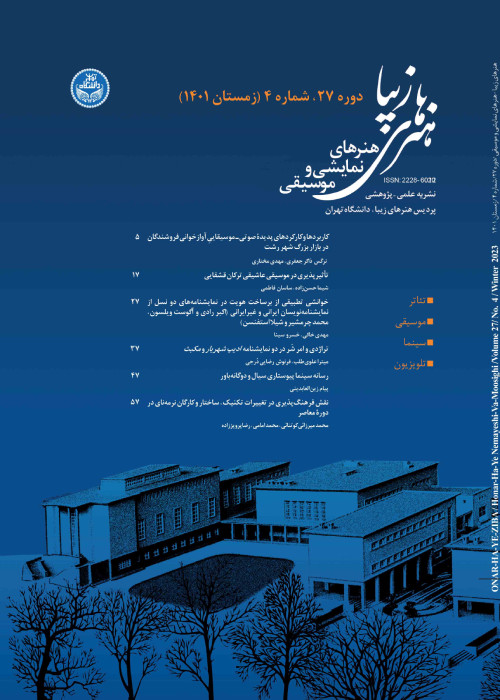A Cognitive Approach to Unreliable Narratives in Cinema
Author(s):
Abstract:
The present study attempts to explore how the so far mainly literary issue of the Unreliable Narratives/Narrators, can be formulated and dealt with in Cinema. Thus, in order to analyze the form and function of such narratives/narrators in Cinema, the present paper tries to discover how the author(s) of the cinematic narrative (the overall collaboration of the screenwriter, the director, the cinematographer, the editor etc.) design(s) unreliability through actions, words, appearance and behavior of characters, story-telling techniques, environmental and audio-visual signs, the mood and atmosphere of the film, its camera work and lighting, editing and its characterization and use of voice-over narration. According to these and depending upon the way the narrative progresses and the order through which story data are revealed, the audience, bringing their own overall knowledge of the world with them to the text, will have different degrees of understanding of how the story must actually be. Since, narratives are created, presented and read/viewed by human beings, with all their mental, emotional and cognitive capacities and properties, the present study adopts a cognitive approach to the analysis of the concept of narrative unreliability, to find out how knowledge of the humankinds’ cognitive faculties can help pattern out and better narratives of the unreliable kind, as we are here interested in, as an author, and be a better reader/viewer in light of what our cognitive knowledge can offer to the task of deciphering behavioral patterns of characters. To achieve that goal, having gained its theoretical roots from David Bordwell’s cognitive approach to film analysis, the present work offers a brief summary of the major thoughts of some other cognitive-minded scholars, such as Noel Carroll, Gregory Currie and Torben Grodal on the subject; in analytic philosophy, narrative theory and film studies (with view to biology and neuroscience), respectively. Then, focusing mainly on Bordwell’s approach, and upon review of the most prominent thoughts given to the concept of the unreliable cinematic narrative, the present paper uses Hansen’s analytic model of how such narratives could actually be represented and formulated in Cinema. Finally, upon study of Hansen’s typology of the unreliable cinematic narratives, and in view of Tamar Yacobi’s five strategies for the naturalization of textual ambiguities and inconsistencies in unreliable narratives in general, and examining filmic examples comprising unreliable narratives, the present paper concludes that different forms of narratives (cinematic narratives as we are here concerned) do not have a limited and predefined pattern and as new narratives are introduced into the world of Cinema, new forms of them can potentially be produced. However, the audience’s experience in reading and viewing texts and films with such narratives can be of great help in deciphering their ambiguities and narratological codes, and enjoying the usually mindful plays on literary/cinematic storytelling at work in them. Nevertheless, it’s noteworthy that floating in the pleasurable realms of ambiguity and secretiveness, and being in a state of uncertainty regarding what is actually going on in what we are viewing, has its own unspeakable twilight zone pleasures.
Keywords:
Language:
Persian
Published:
Honar-Ha-Ye-Ziba: Honar-Ha-Ye Mosighi Va Namayeshi, Volume:20 Issue: 51, 2015
Pages:
15 to 26
magiran.com/p1468446
دانلود و مطالعه متن این مقاله با یکی از روشهای زیر امکان پذیر است:
اشتراک شخصی
با عضویت و پرداخت آنلاین حق اشتراک یکساله به مبلغ 1,390,000ريال میتوانید 70 عنوان مطلب دانلود کنید!
اشتراک سازمانی
به کتابخانه دانشگاه یا محل کار خود پیشنهاد کنید تا اشتراک سازمانی این پایگاه را برای دسترسی نامحدود همه کاربران به متن مطالب تهیه نمایند!
توجه!
- حق عضویت دریافتی صرف حمایت از نشریات عضو و نگهداری، تکمیل و توسعه مگیران میشود.
- پرداخت حق اشتراک و دانلود مقالات اجازه بازنشر آن در سایر رسانههای چاپی و دیجیتال را به کاربر نمیدهد.
In order to view content subscription is required
Personal subscription
Subscribe magiran.com for 70 € euros via PayPal and download 70 articles during a year.
Organization subscription
Please contact us to subscribe your university or library for unlimited access!


